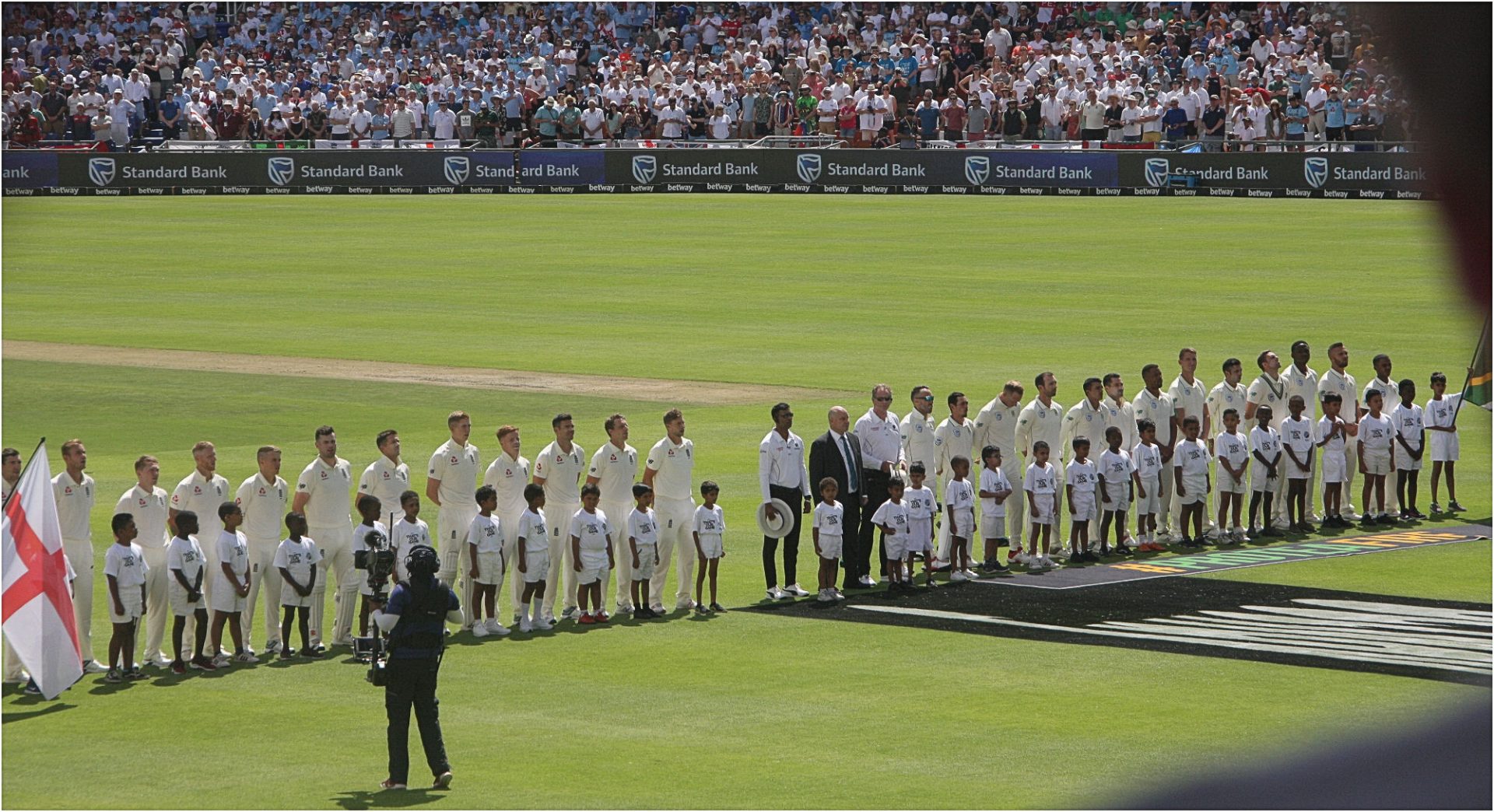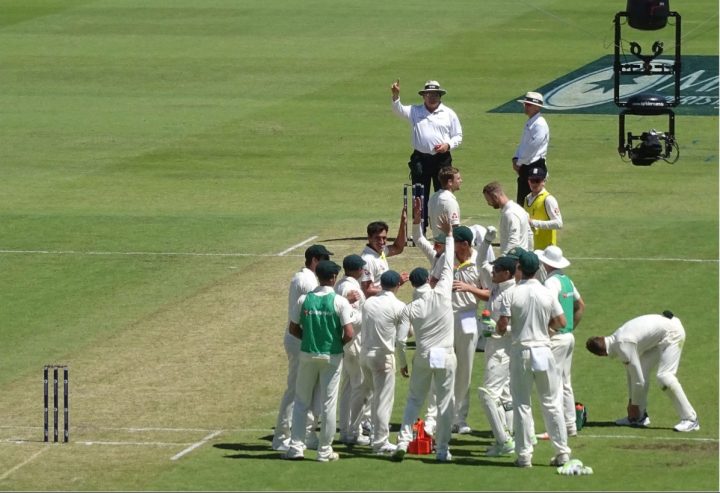Today Geoffrey Bunting returns to TFT with some strong views about Joe Clarke’s inclusion on England’s Covid standby list for the series against the West Indies.
In early February, reports revealed that Joe Clarke is among the Covid reserves for the test series against the West Indies that starts on the 8th March. It emerged on the back of news that the ECB omitted James Anderson and Stuart Broad from the tour – possibly in the hope it would pass under the radar. Cricket journalists obliged with reports celebrating that England’s “best uncapped player” was being considered for selection.
When the ECB is keen to present itself as a diverse and inclusive organisation, including Clarke appears to fly in the face of the optics the ECB has attempted to manufacture. In particular, around the women’s game and attracting a more diverse audience.
For context, it emerged during Alex Hepburn’s 2019 rape trial that he and then teammates, Clarke and Tom Kohler-Cadmore, frequently exchanged what Nick Friend diplomatically branded, “disrespectful comments.” In reality it was as Judge Jim Tindal described, a “pathetic, sexist” conversation which allegedly included jokes about rape, and treated sex as a competition in which women were the game pieces. Hepburn was found guilty and sentenced to five years in prison. For their part, the ECB blacklisted Clarke and Kohler Cadmore. A moratorium that appears to have ended.
But for light summaries, it is a context journalists ignored for many pieces on Clarke’s selection. When confronted with Clarke’s claim that Hepburn is still his best friend, one flippantly replied, “That was three years ago.”
It is a remarkable failure in reportage. One that contributes to the sense of wilful apathy among cricket journalists to the effect a player has on their audience. We are quick to celebrate inspiration – such as how many young girls took up the sport when England won the World Cup in 2017 – but apparently unwilling to highlight the power players have to drive people away.
If the ECB is serious about diversifying participation in the game, that women have commented that Clarke’s inclusion made them “cry from pure anger” or that the ECB is “basically spitting in the face of all the women he degraded” should cause alarm. Instead, these concerns have been largely ignored.
Male pundits and fans are quick to remind us that cricket isn’t about nice people. That teams are composed of different, and often conflicting, personalities.
But this isn’t about a player interrupting the culture of a team; or being self-involved to the point of disruption like Kevin Pietersen. This is about a man who played an active role in a catalogue of behaviours that led to the sexual assault of a woman; who empowered that outcome by maintaining that women are objects in a game. Men fail to understand that what Clarke and Kohler-Cadmore did is a violence in itself. One for which Clarke has failed to express enough meaningful contrition – neither growing or even distancing himself from the rapist.
For all its talk of inclusivity, the ECB maintains a sport that remains dominated by men and exclusionary because of it. When it welcomes men like Clarke into the fold, it sends, as one Twitter user put it to me, a simple message to women: that “victims of sexual assault don’t matter, and that anything that happened to us or anyone else is okay.” At a time when it is already failing to give women adequate facilities, prioritise the women’s game, or sanction those that fail their female cricketers. That doesn’t look inclusive to me.
When we fail to contextualise violence, we empower those who view it as an aberrant and solely physical act, rather than a systematic tool that continues to be deployed against women in cricket and beyond. (Which doesn’t even touch on how much worse it can be for trans and non-binary cricketers in a pointedly binary sport). As neuroscientist, Dr R. Douglas Fields, points out, “Viewing violence narrowly from the perspective of psychological dysfunction shirks the larger truth that the biological roots of rage exist in all of us.”
It is a viewpoint many men don’t want to entertain. Suggesting that cricketers and their personal lives should be separated. Or, as many put it, that cricket should be separate from “politics.” But this is an excuse – used to reject perspectives that don’t align to a highly specific worldview. A claim that we don’t need to look beyond the facades on our TV screens, because to do so we might have to confront our own attitudes towards women; the violence that Dr Fields highlights is in all of us.
Failure to contextualise Clarke’s consideration for selection effectively throws into sharp relief how the game of cricket accepts and protects violence against women. Clarke, remember, hasn’t exactly lacked for work, no matter how much men like to claim he’s been punished enough or, worse, that he did nothing wrong. He’s travelled the world: playing for Perth Scorchers, Karachi Kings, and the Melbourne Stars. When users raised concerns about Clarke on Twitter, the Stars hid the comments because protecting violence is truly a global custom.
Women feel abandoned by cricket journalists, one woman told me. They’ve “let themselves down with this issue and it’s been a shame to see. We need representing too, they’ve turned their backs on us.” But as Clarke’s story shows, this isn’t just about journalists. These men are everywhere. They’re in the media, they’re agents, coaches, executives – they run the game.
As much as the ECB wants to portray itself as inclusive, it has been shown up in the last year alone by the testimony of Azeem Rafiq, by Ollie Robinson, and now by its willingness to ignore women on Joe Clarke.
This isn’t an accident. It’s part of a system that at once claims to welcome everyone, but seems to maintain prejudice against anyone who isn’t white, straight, and male; and refuses change in favour of low-effort and meaningless optics. It’s part of a system that welcomes a player like Joe Clarke despite how unsafe he makes women feel. It is part of a system that fails to listen. And when women tell you they feel unsafe around a man – and I don’t care how good you think they are at their job – you bloody well listen.
Geoffrey Bunting









Yes well. I would have thought that there were far more important things to worry about in the World than permanently punishing people for ten year old tweets and remarks against women however they are perceived to be. I don’t condone it, but really enough of this stuff in sport at least please, there are more important things to do.
“Remarks against women however they are perceived to be” however they are perceived to be?! The man endorses his rapist friend and sees women as objects. That’s plenty important, and if it’s not important to you, you need to take a good long look at yourself in the mirror because you’re a sexist, a misogynist and a rape apologist. You’ve read this article and learned nothing. If Clarke had apologised and showed that he had changed it might have been different. He has NO remorse for his actions and women wherever he plays are unsafe because of it. Disgusting comment.
How dare you! You miss my point completely. I stated I don’t condone it, but I’m entitled to an opinion just like you. And to be frank I am much more concerned with women, children, the disabled and elderly people being murdered in the Ukraine than this constant barrage of accusations and counter accusations around diversity issues in sport, however valid they may or may not be. Incidentally I work with disabled people of all ages and would appreciate you keeping your unfounded biased opinions about me to yourself.
Back to the cricket, England already 3/23 could probably do with Clarke right now.
Amanda–I can understand that women might think that Clarke is a misogynistic little toerag, but why would they feel unsafe given that the sexual contact he had was consensual?
Regarding the friends with Hepburn point–it’s a (in some ways) seductive idea that you should bin your friends immediately they do something unacceptable (and obviously the more unacceptable, the more seductive the idea is!), but I rather struggle with it. Isn’t the whole point of friendship at least in part that you see the good in people, and also their potential for good? And someone doesn’t stop having that purely because he’s done something awful. Obviously it’s a very personal decision to make, but demanding that someone renounce his friendship because of something the friend has done seems to me to ignore how complex both life and friendships are.
To be honest, I rather struggled to see the point–and I still do even after your second tweet. I’m not sure where the ten-year-old tweets were (this series of events started in 2016) and–whatever you think of “remarks against women” (and to me the view expressed several times in these comments about the lack of power of words suggests huge naivety at best both about words, the connection between words and physical behaviour and human behaviour in general)–Clarke followed up his words with actions.
And the phrase “I don’t condone it, but…” leaps out at me–mainly because it makes it read like a rather ambivalent condoning!
Over the top
I’m no fan of Joe Clarke and his cohorts but other than that, over the top.
Speech, no matter how offensive, isn’t violence.
Well said.
Sorry guys but the United Nations, and most definitions of Violence Against Women and Girls (VAWG), would beg to disagree. Their 1993 declaration on this subject uses the words “Any act of gender-based violence that results in, or is likely to result in, physical, sexual or psychological harm or suffering to women, including threats of such acts, coercion or arbitrary deprivation of liberty, whether occurring in public or in private life”. The declaration goes on to talk about how “jokes” and remarks at women’s expense do, indeed, contribute towards VAWG.
Your quote doesn’t make that case.
It makes perfect sense to those who want to understand.
Hi Guys. Appreciate that this is a very emotive topic. Please keep in mind what has / hasn’t been legally proven before commenting. Thanks.
The fact of the matter is pretty well as Amanda has described inasmuch as the lack of remorse and willingness to understand the harm created by such comments. I have been married for 45 years, my wife has never been more scared of venturing out in public in her whole life and fears for our granddaughter because of the aggressive and in your face actions and words (yes, speech sadly can be very violent) of many men. How we change attitudes I do not know but it is definitely heading in the wrong direction aided and abetted by the bravado afforded men by social media.
You just need to read some of the comments here to understand why things aren’t going to change.
“my wife has never been more scared of venturing out in public in her whole life and fears for our granddaughter”.
Consider that the media have deliberately engineered those emotions and that you should change your behaviour by not buying them rather than expecting other people to change theirs so that you can “feel safe”.
No, Simon. Ask anyone whose family has been directly impacted by such events if the resultant emotions have been ‘engineered’ and you will find the answer to be a resounding ‘no’. I think you need to approach this subject with a wee bit more sensitivity.
I am confused, how do you do that when one receives a torrent of invective on entering,as a n example, a pub etc.? As Barry has commented, why don’t you get out more and speak to people with experience rather than depend on interpreting the media?
Oh Chris–you’re confused because you’re missing the basic point that you should be prioritising the abstract conceptual mansplaining of some middle-aged man who hasn’t ever experienced that part of life from a woman’s perspective rather than the fears of the woman who’s being scared and actually having that experience. Simples…:-)
Good grief, you must live in a grim neck of the woods for such behaviour to be endemic.
One of the problems that never gets discussed when this issue raises its head is the increasing level of ladettes breaking into the lad culture. Here girls and young women behave pretty much like their male counterparts. This is not a small minority of young people we are talking about but a general trend. Anyone who lives in cities will have become increasingly aware of this new breed over the last generation or two. This leads lads to a greater level of expectation when the behaviour of the opposite sex encourages them.
I am in no way justifying what I see as a regrettable trend but it has to be recognised as a significant contributory factor in the increasingly misogynistic behaviour of young men.
We live in an atmosphere where any inappropriate behaviour is publically judged, the present generation has to deal with an unprecidented level of exposure previous generations rarely had to be concerned about. Young people are not mature adults and should be dealt with in an educated way, not by knee jerk.
I recognise I will be vilified in certain quarters for this relatively passive blog and will be seen as part of the problem not the solution, but I will not jump on anybody’s bandwagon just to fit in with the prevailing attitudes.
Whatever your intent, this post really SOUNDS like it’s justifying misogynistic behaviour! The crux of it seems to be that the people substantially responsible for misogynistic behaviour are…women. Which is the classic minimising and justifying argument–aggression is justified because the recipient provoked it (like Ukraine, presumably!) That’s completely upside down, it seems to me: the people responsible for men’s misogynistic beahviour should be–surprise, surprise–men.
And if arguing that treating your fellow human beings with respect, politeness, not trying to routinely belittle them and not assaulting and raping them is a bandwagon, then count me in as a bandwagoneer!
Wow. Sorry I spoke. My point was trying to give things some perspective in relation to other worse things going on in the world not to upset people, and particularly not to be insulted myself for having a different viewpoint..
Not sure that this is a subject for a cricket site discussion anyway.
You’re not reading what I say carefully enough. All I am pointing out is there’s no simple reason or solution to this. There are factors present which have to be considered, however non PC if you’re going to find a long term solution. You’re reaction is exactly the knee jerk I’m talking about and why these problems are getting worse, i.e; the increasingly misogynistic behaviour of young men. In order to sort this you have to address the young men’s attitudes with them not outsiders. It’s the old adage that you can’t stop ideas by burning books.
Hang on–my suggesting that misogyny should be tackled by addressing the behaviour of the misogynists rather than the behaviour of the group they’re targeting makes a misogyny problem worse?! And you’re talking about MY reaction being knee-jerk? You might want to look at your own knee a little…:-)
I think I’m reading what you wrote perfectly carefully enough–but your two posts completely contradict each other. One is saying that misogyny can only be tackled by addressing the misogynists rather than “outsiders” (by which I assume you mean other people–it doesn’t refer to anything in my post)…which is exactly what I was saying. The other is seeking to outsource some of the responsibility to women–and THAT’S what I was arguing against. As you imply, you can’t change the behaviour of some men by looking to women to change their behaviour; you need to look at the behaviour of those men. In my view, seeking to outsource the responsibility to women makes the problem worse.
I also don’t think that the implication that there are no degrees or shades of misogyny or of opinions which help it to flourish helps. That’s just an exercise in feeling good about ourselves isn’t it? (“I’m not blatantly misogynistic, so nothing I say or think could possibly help it to flourish…”)
I’m not outsourcing women atall, merely pointing out that the behaviour of a large proportion of young women these days is a contributory factor. You can’t ignore that in addressing the issue. Any solution needs to acknowledge this. You’re really not getting my point atall. My posts are perfectly aligned, just differently slanted to address your reaction. The idea that they contradict each other is nonsense. You need to re-read them.
Every woman who I count as a friend (and therefore close enough to discuss this type of sensitive thing with) and the women in my own family have told me they have been sexually assaulted at least once in their life. Every single one. By you’re argument, they’re all “ladettes” (which they’re not; some of them are talking about events in the 60s, 70s. 80s, so before your “these days” timeline) or their behaviour somehow contributed to their assault (which is a classic victim blaming cliche that I thought had long been put to bed…)
Or you can just admit to yourself that you’re utterly unwilling to accept the reality of the situation.
Wow. Sorry I spoke. My point was trying to give things some perspective in relation to other worse things going on in the world not to upset people, and particularly not to be insulted myself for having a different viewpoint..
Not sure that this is a subject for a cricket site discussion anyway.
I think it’s a wonderfully appropriate subject for a cricket site–simply because cricket lovers and players come in all genders (and sexualities, races, degrees of physical ability and so on). And while if we’re straight white able-bodied men we might have the luxury of thinking that it doesn’t apply to us, not everyone has that luxury. It’s fantastic that we’ve been given the opportunity to think about that, to my mind: that’s the essence of “what do they know of cricket who only cricket know”, surely?
Not sure what you are trying to say here? “Luxury of thinking that it doesn’t apply to us”. What exactly? People are people regardless of sex, gender, creed or race. Why do we need to put them in categories? Does it make us feel better?
“People are people”… well, yes, that IS true. But are you really saying that all people are treated absolutely equally in our current society, regardless of class, gender, race, age, etc? Because it sounds like that’s what you’re saying….
As for “Does it make us feel better?” — I genuinely have no idea what that means. Who is the “us”? But if you’re referring to more areas of society being more open to a wider group of people and voices, many of which have long been marginalised, then yes, it does make us feel better, as it should.
No I’m saying don’t put them in categories, treat everyone the same. And it probably does make some people feel better by categorising them as different from each other. One and the same really.
People are people but the fear of going out at night is overwhelmingly felt by one half of the population, similarly, the fear of being followed down a street or of aggressive and unwanted attention. We wouldn’t need to “ put people into categories” if this weren’t the case.
Sadly reminiscent of the minority of people who Boo’d the taking of the knee. The “all lives matter” brigade who didn’t give a toss about all lives until THEY suddenly felt left out.
I was pleased to see this being discussed on this site.
But a lot of replies here seem to be missing the main points of the article:
– Clarke has shown no remorse or contrition for his and his friend’s comments/actions.
– The ECB are well aware it was a dodgy move, so they announced on same day as major news about dropping veteran pros. (Melbourne Stars were also aware, and so hid comments)
– Cricket journalism in general has decided to circle the wagons and ignore it.
– And, ironically, this is all happening at a time when there’s a lot of PR noise/guff about “inclusivity”.
None of that is debatable.
And it’s worth talking about on a cricket site because it is happening in cricket.
If you really need more information about why violence or threats of violence towards women shouldn’t be brushed under the carpet, then please read here:
https://rapecrisis.org.uk/get-informed/about-sexual-violence/statistics-sexual-violence/
Great share!
Found your post interesting to read. I cant wait to see your post soon. Good Luck for the upcoming update.
This article is really very interesting and effective.